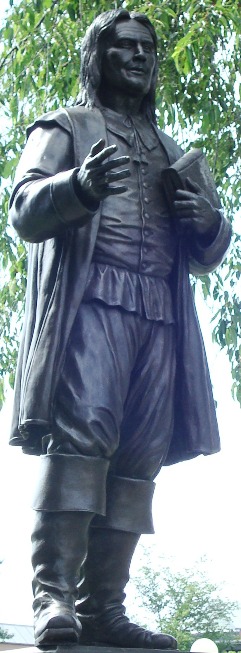
Roger Williams Statue
Williams argued that all title to Indian land should be validated by specific negotiations and at an agreed, fair price.
He did not believe, as Winthrop's Anglicans held, and as even the Pilgrim Fathers had accepted, that God covenanted with a congregation or an entire society. God, he held, covenanted with each individual. The logic of this was not merely that each person was entitled to his own interpretation of the truth about religion, but that in order for civil society to exist at all there had to be an absolute separation between church and state. In religion, Williams was saying, every man had the right to his individual conscience, guided by the inner light of his faith.
'All men may walk as their consciences persuade them, every one in the name of his God. And let the Saints of the Most High walk in this colony without molestation, in the name of Jehovah their God, for ever and ever.'
'It is impossible for any man or men to maintain their Christ by the sword, and to worship a true Christ.'
'No person within the said colony, at any time hereafter, shall be in any wise molested, punished, disquieted or call in question, for any difference in opinion in matters of religion ... but that all ... may ... at all times hereafter, freely and fully have and enjoy his and their own judgments and consciences in matters of religious concernments.'